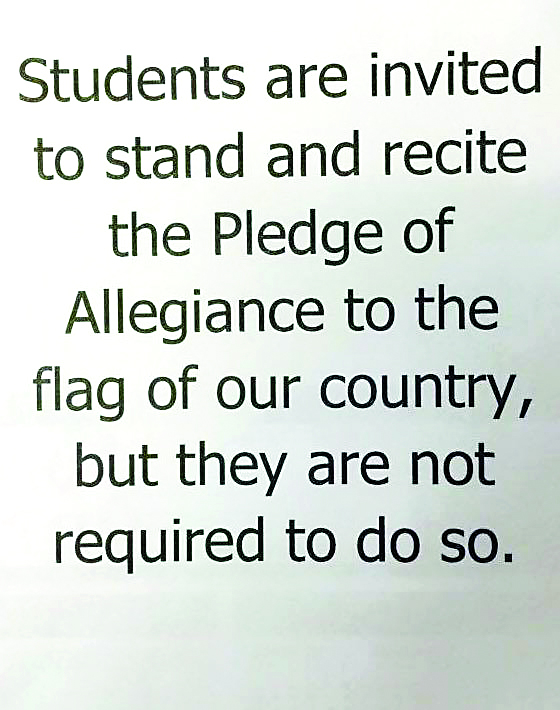

These signs were sent out to area schools last week and must be posted under the American flag in each school district classroom per an agreement with American Atheists and the Santa Rosa County School District.
Parents in the north end of the county and an atheist advocacy group are to blame for signs that recently popped up in classrooms around the Santa Rosa County School District that have caused major backlash.
The signs, which are posted near the American flags in each classroom, read “students are invited to stand and recite the Pledge of Allegiance to the flag of our country, but they are not required to do so”.
The PDFs of the signs were sent out to every school administrator last Thursday per an agreement with a complainant party who has a child who attends a school in the north end of Santa Rosa County.
“It originated as a parent complaint,” said David Gunter, Director of Middle Schools for the Santa Rosa County School District. “The complainant then contacted an advocacy group who has an attorney on staff.”
The advocacy group, American Atheists, had their legal party go back and forth with the school district’s attorney on the issue until an agreement was made between the two parties.
According to American Atheists Legal Director Amanda Knief, two parties in the north end of the county made a complaint back in September to the school district about the violation of their child’s rights after the students were allegedly forced to stand and recite the Pledge of Allegiance.
“We were contacted by the parents of a couple of students who were concerned that their children were forced by their teachers to participate in the pledge….they were required to stand,” Knief said.
One of the complainant parties eventually had the issue resolved, but the other, a parent of an autistic child, forced the matter into a legal issue.
“The student is autistic and he is very sensitive to authority figures and teachers. The student had made the decision to not participate, and he was told to stand (by his teacher),” Knief said. “He complied because he didn’t want to upset his teacher. We were concerned that the teacher was using authority to violate his rights, and that it was inappropriate.”
The advocacy group then contacted the school district, and went back and forth with the district on how to resolve the issue.
“We weren’t making any kind of demands,” Knief said. “Florida law requires that students be told they do not have to participate (in the Pledge of Allegiance).”
And according to Knief, that message (up until this point) had not been conveyed in any way to students at Santa Rosa County schools.
“There is nothing in the student handbook (Student Code of Conduct) this year. We weren’t going to make the district reprint them,” Knief said. “Since it wasn’t (in the handbook), we were looking for a way to educate students, teachers and administrators of their constitutional rights.”
Eventually, the two parties came to a resolution.
That solution came in the form of a piece of paper.
A piece of paper that was to be posted under the American flag in every classroom in the school district.
“As part of the agreement with the advocacy group, the district agreed to post these signs,” Gunter said. “(The complaint was made) after school had already started. Obviously we were negotiating back and forth with the complainant party. The district lawyers came up with a solution to mitigate the issue.”
The signs stated that students were not required to stand or say the Pledge of Allegiance. Knief said the signs were a way to simply educate the staff and students about their constitutional rights, and to bring the schools up to compliance with state and federal laws.
“Students have to be informed that they do not have to participate,” Knief said. “We found there seems to be this general misunderstanding between school teachers and administrators about a student’s rights. They have to be informed that they do not have to participate.”
Florida state statutes and federal rulings back up the pieces of paper, according to the director of middle schools and Knief.
“Statutes state that we were violating his (student’s) First Amendment rights by requiring him to stand or recite the Pledge of Allegiance,” Gunter said. “For us, it’s a compliance issue. This is federal law.”
According to the advocacy group’s website (atheists.org), the objective of the group is to fight for the civil liberties of atheists and the total, absolute separation of government and religion.
As of Wednesday, Knief said she had not been informed by the school district that the signs were up at all of the schools and whether or not the district was in compliance with the agreement.
“We understood that it would be within several weeks,” Knief said. “We have not received notice that (the signs have been posted)…we still have not received a complete resolution.”
Knief said the message the advocacy group wanted to portray (per the agreement) was not that a student should have their rights taken away, but that they should be notified of their rights.
“We’re on the side of constitutional rights. It’s been established by the Supreme Court for decades that you can’t force students to participate in the Pledge of Allegiance. If someone has an objection to say the Pledge, schools need to respect that student’s rights,” Knief said.
Gunter said that the signs have caused “some” complaints, and said that regardless of the backlash from the signs, the district has to inform school children of their constitutional rights.
“The pledge is still going to be said in every class every day. The teachers are still going to direct the Pledge of Allegiance. The only difference is, now we are going to be in compliance with federal law,” Gunter said.





































